Beginners Guide To Camping: Camping is a wonderful outdoor pursuit that allows us to rekindle our connection with the natural world. It serves as the perfect escape from our hectic, fast-paced lives, offering a respite from the demands of modern living. If you find yourself new to the exhilarating world of camping, fear not, for we are here to provide you with a wealth of knowledge and guidance.
In this all-encompassing guide, we will take you on a journey into the heart of camping, ensuring that your experience is nothing short of unforgettable. We’ll cover every aspect, from the absolute essentials of camping gear to tantalizing campfire recipes that will leave your taste buds craving for more.
So, together, let’s embark on this remarkable journey and delve into the intricacies of “The Beginners Guide To Camping: Everything You Should Know.” Whether you’re a novice or a seasoned camper looking for fresh insights, we’ve got something for everyone. Get ready to discover new things about camping you have never seen before.
Also Read:- Tips for a Seamless Destination Elopement
10 Most Scenic Places To Camp In The USA
Yosemite National Park, California
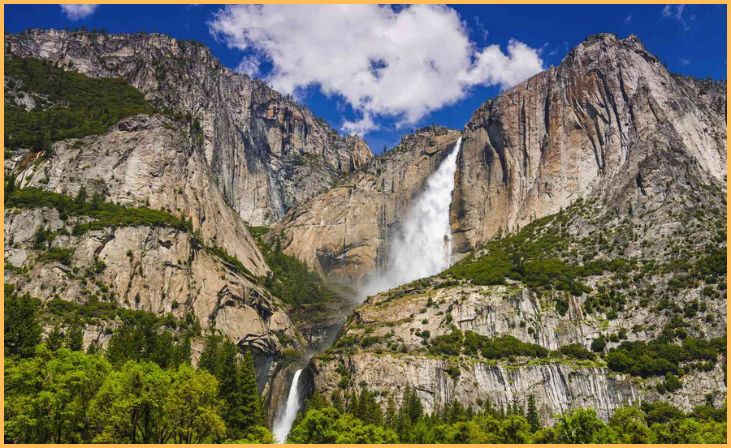
Yosemite, a crown jewel of American national parks, is a place where nature’s grandeur is on full display. Breathtaking waterfalls, meadows painted with wildflowers, and monumental granite cliffs make this park a true wonder. Camping near El Capitan, one of the world’s most famous rock formations, allows you to witness the sheer verticality of this rock giant. As night falls, look up to the starry skies, and you’ll feel a profound connection with the universe.
Grand Canyon National Park, Arizona
Camping on the rim of the Grand Canyon is nothing short of a surreal experience. The vastness and geological wonders here are unparalleled. The canyon’s sheer depth and the Colorado River carving through it are humbling sights. As you sit by your campfire on the rim, you’ll be treated to a display of colors as the sun sets and the stars begin to twinkle in the desert night.
Great Smoky Mountains National Park, North Carolina and Tennessee
The Great Smoky Mountains, shrouded in mist and rich in biodiversity, provide an enchanting backdrop for camping. The lush landscapes are a sight to behold, with rolling hills and dense forests. Camping here means immersing yourself in a diverse range of flora and fauna, from colorful wildflowers to black bears.
Glacier National Park, Montana
Known as the “Crown of the Continent,” Glacier National Park offers pristine alpine lakes and rugged mountain landscapes that create stunning camping sites. The iconic Going-to-the-Sun Road takes you through jaw-dropping scenery. Camping here means waking up to mirror-like lakes and the distant calls of mountain goats. Keep reading to know more about the Beginners Guide To Camping.
Acadia National Park, Maine
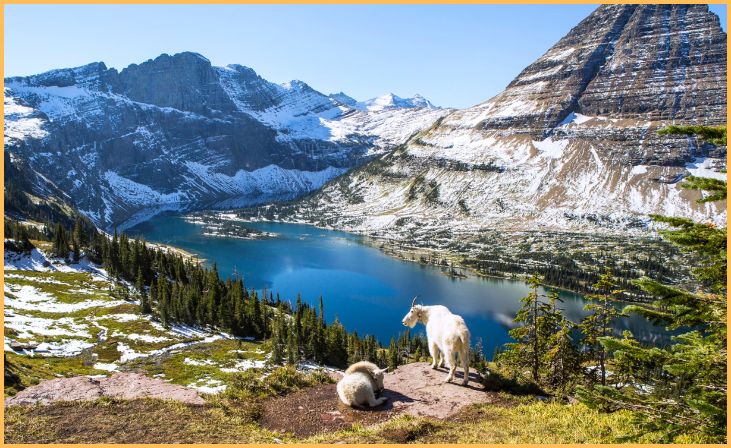
Coastal camping at its finest, Acadia National Park allows you to enjoy the rugged Atlantic coastline, with its dramatic cliffs and tidal pools. Granite peaks offer panoramic views, and picturesque lakes are perfect for a quiet kayak ride. Camping by the ocean here is a chance to be lulled to sleep by the sound of waves.
Zion National Park, Utah
Zion’s red rock formations are towering giants that provide a dramatic backdrop for your camping adventure. As you hike along the Virgin River, you’ll witness stunning vistas and discover hidden canyons. Camping in the shadow of these natural sculptures is an experience that connects you with the raw power of nature.
Yellowstone National Park, Wyoming
Yellowstone is a geothermal wonderland. Gushing geysers, bubbling hot springs, and the enigmatic Old Faithful are just a few of the remarkable features of this volcanic wonderland. Camping in Yellowstone means being in close proximity to nature’s most dramatic performances. At night, the chorus of wolves and bubbling mud pots provide a unique camping soundtrack.
Big Sur, California
Along the Pacific Coast, Big Sur offers coastal camping with unparalleled beauty. Campers can enjoy the mesmerizing views of coastal cliffs and the vast expanse of the ocean. It’s not only a scenic camping destination but also a stunning road trip, making it a perfect spot for those who crave adventure and natural beauty.
Olympic National Park, Washington
Olympic National Park is a diverse wonderland that spans from lush rainforests to glacier-capped mountains. The park offers various camping experiences within its boundaries. Whether you choose to camp in a pristine forest or near the snow-capped peaks, you’ll be treated to the richness of this unique ecosystem.
Sedona, Arizona
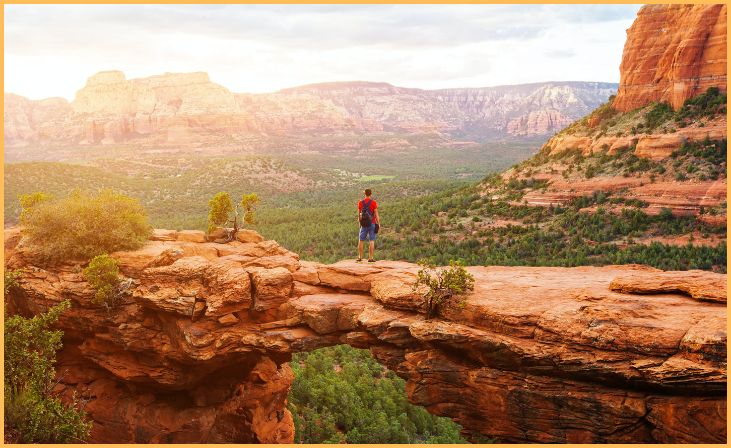
Known for its stunning red rock formations, Sedona provides a unique camping experience in the heart of the desert. The vibrant red rocks create a stunning backdrop for your camping adventures, especially at sunset when the landscape is bathed in a warm, fiery glow. Continue scrolling through to know more about the Beginners Guide To Camping.
Also Read:- Off-the-Beaten-Path Hiking Trails in Europe for Adventure Enthusiasts
Top 10 Tips For Camping In Bear Country
1. Research Your Destination:
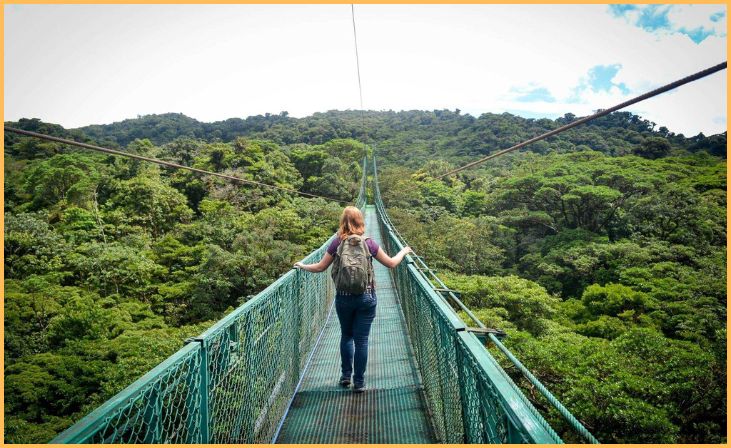
Before embarking on your camping adventure, thorough research is a must. Find out which type of bears inhabit the area you plan to camp in, whether they are grizzly or black bears. Different species may have varying behaviors and responses to human presence. Additionally, familiarize yourself with the specific guidelines and regulations for camping in that area. Parks and regions often have their own rules regarding bear safety, and following them is essential to ensure a safe trip.
2. Bear-Resistant Food Storage:
Invest in bear-resistant containers or storage systems for your food, toiletries, and cooking utensils. Bears have an incredibly acute sense of smell and can detect scents from miles away. These containers are designed to keep odors locked in, preventing curious bears from being drawn to your campsite. Keeping your items secure is crucial for both your safety and the bears’.
3. Cook and Eat Away from Your Campsite:
To minimize the risk of attracting bears to your sleeping area, designate a separate location for cooking and eating. The odors produced during meal preparation can be strong and are known to attract bears. By keeping this area away from your sleeping quarters, you reduce the chances of unwanted bear encounters during the night.
4. Proper Food Handling:
It’s essential to be diligent about cleaning up after meals. Dispose of food scraps in sealed bags or containers to ensure no lingering odors attract bears. Additionally, wash your dishes and cooking utensils thoroughly, using biodegradable soap if possible. Proper food handling practices not only prevent bear visits but also help maintain the natural environment. Keep scrolling through to learn more about the Beginners Guide To Camping.
5. Pack Odor-Barrier Bags:
Odor-barrier bags are an excellent addition to your camping gear. Use these bags to store your food, trash, and any scented items like toiletries. Hanging these bags in a tree away from your camp can deter bears from coming too close. These bags are designed to minimize odors and provide an extra layer of protection.
6. Bear Bells and Whistles:
Bear bells and whistles are valuable tools for alerting bears to your presence while hiking. Attaching bear bells to your gear or clothing can produce a continuous sound that helps make bears aware of your approach, reducing the chances of surprising them. Additionally, speaking loudly or singing while hiking serves the same purpose, giving bears the opportunity to move away.
7. Bear Spray:
Bear spray is a highly effective deterrent to have on hand. It’s a type of pepper spray specifically designed to deter bears in the event of a close encounter. Be sure to carry bear spray with you and understand how to use it properly. While it’s crucial for safety, it’s also essential to remember that it should be used as a last resort if a bear approaches aggressively.
8. Stay Informed About Bear Activity:
Before and during your camping trip, stay in contact with park rangers or local authorities to stay informed about recent bear activity in the area. Knowing about recent sightings or encounters can help you plan your camping trip more safely. Rangers often have valuable insights and can provide you with real-time information about bear behavior in the region.
9. Travel in Groups:
Camping in a group is generally safer in bear country. Bears are less likely to approach larger groups of people, as they tend to avoid human presence. Whenever possible, avoid camping alone, and opt to camp with others. Safety is enhanced when you have companions with you who can share in bear safety practices and help keep watch.
10. Respect Wildlife:
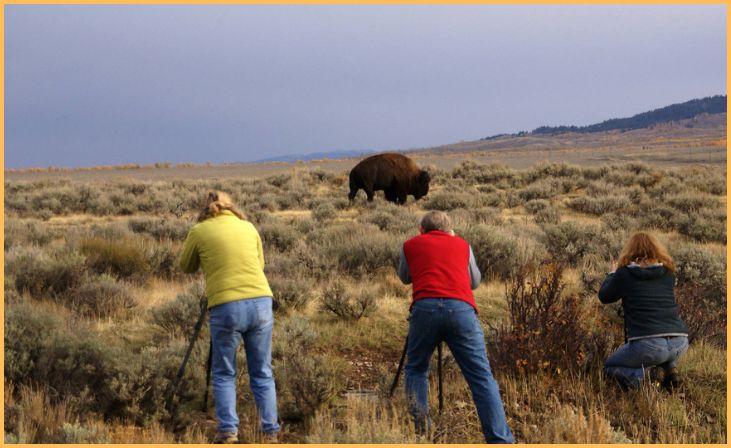
One of the most critical aspects of camping in bear country is respecting wildlife. Always maintain a respectful distance from all animals, not just bears. Never approach a bear for a photo or any other reason. Keep your campsite clean and free of food scraps to minimize the chances of attracting bears. This respect for the natural world not only ensures your safety but also protects the bears and their habitat. Continue reading to learn more about the Beginners Guide To Camping.
Also Read:- Best Party Destinations near Florida
8 Ways To Stay Safe For Outdoor Novices While Camping
1. Plan and Prepare:

An important part of having a great camping trip is planning. Before setting out, invest time in thorough preparation. Begin by researching your camping destination. Understand the local weather conditions, as these can greatly impact your camping experience. Familiarize yourself with the terrain, noting any potential hazards or challenges. Creating a checklist of essential gear and supplies ensures you won’t forget anything vital. This checklist should include items like your tent, sleeping bags, cooking equipment, clothing suitable for the weather, and navigation tools like maps and a compass. Adequate preparation not only boosts your confidence but also ensures you’re well-equipped for a variety of situations.
2. Choose the Right Campsite:
For outdoor novices, selecting the right campsite is crucial. Opt for well-established campgrounds that cater to beginners. These campgrounds often offer amenities such as restrooms and potable water sources, which can make your camping experience more comfortable. Look for campgrounds with designated tent spaces to simplify the setup process. These locations are well-suited for those who are new to camping and may not have extensive outdoor experience.
3. Practice Setting Up Your Gear:
Camping gear can be a bit intimidating if you’re new to the activity. To alleviate any stress or challenges during your camping trip, practice setting up your gear at home before embarking on your adventure. This includes assembling your tent, using your camping stove, and handling any other equipment you plan to bring. Familiarity with your gear ensures you can set up camp efficiently and enjoy a smoother, more enjoyable experience in the great outdoors.
4. Safety First:
Safety should always be a top priority. Learn the basics of first aid and carry a well-stocked first aid kit. Knowing how to handle minor injuries or issues that may arise during your camping trip can be invaluable. Additionally, be aware of any potential hazards in your camping area. This may include knowledge of local wildlife, weather conditions, and any unique challenges presented by the terrain. Take precautions to avoid accidents, such as securing your campsite properly to prevent accidents like tripping over tent lines.
5. Inform Someone of Your Plans:
It’s essential to let someone know about your camping plans. Share details about your destination and the expected return date with a trusted individual who isn’t joining the trip. In the event of an emergency, this information can be vital for rescuers to locate you. Ensure you provide contact information for park rangers or local authorities as well. Keeping lines of communication open is a safety net for any unexpected situations.
6. Pack Adequate Food and Water:
Proper nutrition and hydration are fundamental for a successful camping trip. Ensure you have enough food and clean drinking water to last your entire journey. Plan your meals and pack non-perishable, easy-to-prepare foods, which are practical for outdoor cooking. It’s better to have extra supplies than run out during your camping adventure. Dehydration and hunger can quickly sap your energy and reduce your enjoyment of the outdoors.
7. Weather Preparedness:
Weather conditions in the outdoors can be unpredictable. Check the weather forecast for your camping location before departure. Be prepared for changing conditions by packing appropriate clothing and gear. This includes rain gear to stay dry during wet weather and extra layers for warmth in colder temperatures. By being weather-ready, you can adapt to whatever nature throws your way and stay comfortable during your camping trip.
8. Leave No Trace:
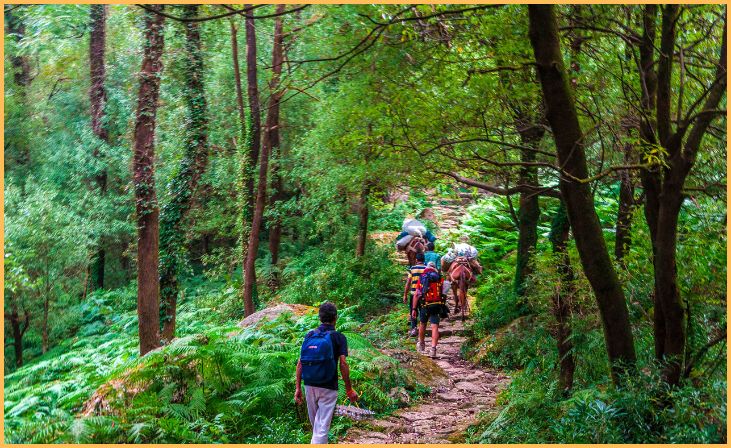
Finally, practicing Leave No Trace principles is a fundamental aspect of responsible camping. Show respect for the environment and fellow campers by cleaning up after yourself. Dispose of trash properly by packing it out, and avoid disturbing wildlife by keeping a respectful distance. Leave your campsite as pristine as you found it, ensuring that future generations can also enjoy the natural beauty of the outdoors. These principles not only help protect the environment but also contribute to the safety and enjoyment of all campers.
Also Read:- Honeymoon road trip destinations in the USA
9 Best High-Tech Camping Gadgets For 2023
1. Portable Solar Panels:
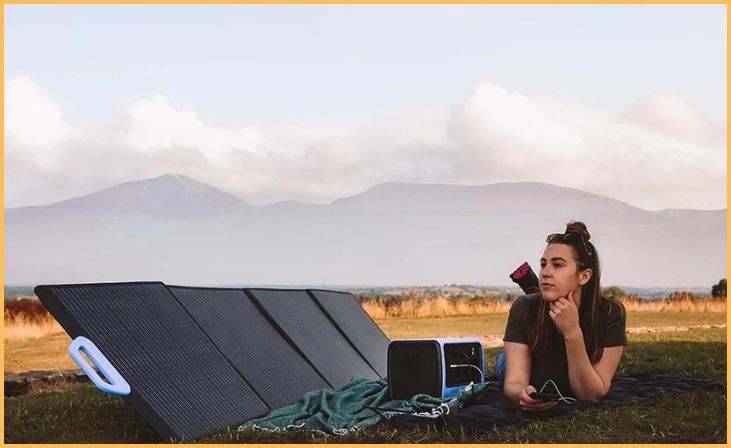
High-quality portable solar panels have transformed the camping experience. They harness renewable solar energy to charge your devices, from smartphones to GPS units. These panels are lightweight, easy to transport, and eco-friendly. They ensure you stay connected and powered up even in remote camping locations. With the sun as your power source, you can explore off-grid destinations without worrying about running out of battery.
2. Camping Lantern with Bluetooth Speaker:
Combining illumination and entertainment, camping lanterns with built-in Bluetooth speakers delight the camper. Not only do they provide ambient lighting for your campsite, but they also let you play your favorite tunes. This dual functionality creates a cozy and enjoyable atmosphere, whether you’re sharing stories around the campfire or simply unwinding in the evening.
3. GPS and Satellite Communicator:
High-tech GPS devices with satellite communication capabilities are essential tools for wilderness safety. They do more than just help you navigate; they allow you to share your precise location, send messages, and even request assistance if needed. In remote areas where cellular signals are weak or absent, these devices provide peace of mind, making them valuable for navigation and emergencies.
4. Smart Camp Stove:
Smart camp stoves, such as the BioLite CampStove, are innovative and eco-friendly. They convert the heat energy from your campfire into electricity, which you can use to charge your devices while cooking. These stoves not only reduce your environmental footprint but also ensure you have a reliable source of power for your gadgets, keeping you connected in the great outdoors.
5. Portable Espresso Maker:
For coffee enthusiasts, a portable espresso maker is a must-have camping gadget. These compact devices allow you to brew a delicious cup of coffee even in the heart of the wilderness. Starting your day with a caffeine boost becomes a simple pleasure, enhancing your camping experience.
6. Portable Water Purifier:
High-tech water purifiers use advanced filtration and purification methods to turn natural water sources into safe drinking water. Some models are small and lightweight, making them ideal for backpacking and camping in remote areas. With these devices, you can confidently rely on local water sources, reducing the need to carry heavy supplies.
7. Smartwatch with Outdoor Features:
Modern smartwatches offer a range of outdoor features. These include GPS tracking, altimeters to measure elevation, barometers for weather forecasts, and more. While they excel at fitness tracking, they’re equally valuable for navigation and outdoor data collection. Smartwatches are versatile tools that enhance your camping experience.
8. Headlamp with Motion Sensor:
High-tech headlamps with motion sensors are a convenience during camping. They automatically adjust their brightness based on your movement, ensuring you have the right amount of light when you need it. Whether you’re setting up camp in the dark or navigating around the campsite at night, these headlamps provide hands-free and efficient illumination.
9. Campsite Security Cameras:

For added security and peace of mind, portable campsite security cameras are a modern addition to camping gear. These devices provide real-time video monitoring of your campsite, allowing you to keep an eye on your belongings and surroundings. Whether you’re exploring the area or resting in your tent, you can have a visual connection to your campsite.
Final Words
Beginners Guide To Camping: Camping is a remarkable outdoor pursuit that allows us to rekindle our connection with the natural world. It serves as the perfect escape from our hectic, fast-paced lives, offering a respite from the demands of modern living. If you find yourself new to the exhilarating world of camping, fear not, for we are here to provide you with a wealth of knowledge and guidance.
In this all-encompassing guide, we’ve embarked on a journey into the heart of camping, ensuring that your experience is nothing short of unforgettable. We’ve covered every aspect, from the absolute essentials of camping gear to tantalizing campfire recipes that will leave your taste buds craving for more.
So, together, let’s embark on this remarkable journey and delve into the intricacies of “The Beginners Guide To Camping: Everything You Should Know.” Whether you’re a novice or a seasoned camper looking for fresh insights, we’ve got something for everyone. Get ready to explore the world of camping like never before, where every step in nature is a step closer to adventure and discovery. Happy camping!
FAQs
A1: We cover all the essential gear you need to get started in the world of camping, from tents and sleeping bags to cooking equipment and navigation tools.
A2: We provide a comprehensive list of tips, including information on bear-resistant food storage, proper food handling, and staying informed about bear activity.

